关于海洋环境保护的英语演讲
保护海洋英语演讲稿
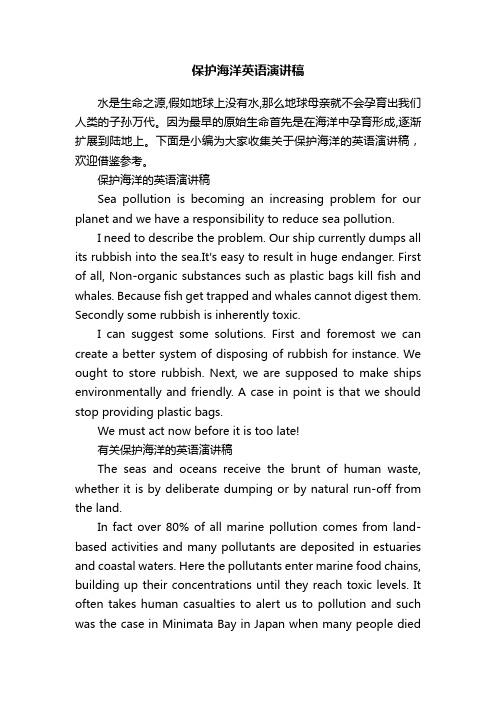
保护海洋英语演讲稿水是生命之源,假如地球上没有水,那么地球母亲就不会孕育出我们人类的子孙万代。
因为最早的原始生命首先是在海洋中孕育形成,逐渐扩展到陆地上。
下面是小编为大家收集关于保护海洋的英语演讲稿,欢迎借鉴参考。
保护海洋的英语演讲稿Sea pollution is becoming an increasing problem for our planet and we have a responsibility to reduce sea pollution.I need to describe the problem. Our ship currently dumps all its rubbish into the sea.It's easy to result in huge endanger. First of all, Non-organic substances such as plastic bags kill fish and whales. Because fish get trapped and whales cannot digest them. Secondly some rubbish is inherently toxic.I can suggest some solutions. First and foremost we can create a better system of disposing of rubbish for instance. We ought to store rubbish. Next, we are supposed to make ships environmentally and friendly. A case in point is that we should stop providing plastic bags.We must act now before it is too late!有关保护海洋的英语演讲稿The seas and oceans receive the brunt of human waste, whether it is by deliberate dumping or by natural run-off from the land.In fact over 80% of all marine pollution comes from land-based activities and many pollutants are deposited in estuaries and coastal waters. Here the pollutants enter marine food chains, building up their concentrations until they reach toxic levels. It often takes human casualties to alert us to pollution and such was the case in Minimata Bay in Japan when many people diedas a result of a pollutant building up in food chains. A factory was discharging waste containing methyl mercury in low concentrations into the sea and as this pollutant passed through food chains it became more concentrated in the tissues of marine organisms until it reached toxic levels.As a consequence 649 people died from eating fish and shellfish contaminated with mercury and 3500 people suffered from mercury poisoning.保护海洋英语演讲稿范文Future marineKnow you today from the 2009, let me do a return tour, you tour in 2030 with the "Ocean", I think you must be harvested. As we all know, oceans of the Earth's seven tenths, very serious marine pollution in 2009, but in 2030, due to advanced science and technology, "decontamination robot" has become the bane of marine pollution, so, when there is no pollution in the ocean. Now, I take you first "multi-functional reception", and replace "changes in the marine location device", it all took us off to another world. T oday's oceans, is home to human beings, 50 percent of people worldwide live in the ocean, you will find it very curious about how to survive in the ocean? Fact Well, Sea World, where there is an "oxygen control room," Oxygen produced from here, through the "oxygen cylinder" sent to every corner of Ocean, people breathing in fresh oxygen, emit carbon dioxide, and then by the "oxygen control room" to receive, but also to create such a cycle of oxygen ... ....Harbour fish is strange, since the sea water into fresh water, the fish learned human language, but also to talk with people it can be fun! You to the front of a large group of fish, fish said: "Good morning!" Fish will speak English, I am really not believeit. Listen to my introduction to you on the residential areas. Although before you see is a blank, but people live here. The sea and land were not the same person, they food is simple, a "simple food Dan" can be over 100 days, so they are very relaxed. Live it? To four "sea" as their home, think of where to sleep on where to sleep, carefree.Then, you visit the Royal Palace, Park ... ... must have felt very grand, magnificent it! Perhaps you worry about, so many people living in the seabed, the environment will not occur the problem? Not. Harbour achieved without factory, but there are production. And no worse than the production of the land, because we row down the waste land, water, through the "decontamination robot" "pass" "make the robot" for processing, making available all kinds of things ... ... strange, wonderful sea world tour finished, how? I am sure you will feel the power of science is so magical.。
保护环境的3分钟英语演讲稿(精选11篇)
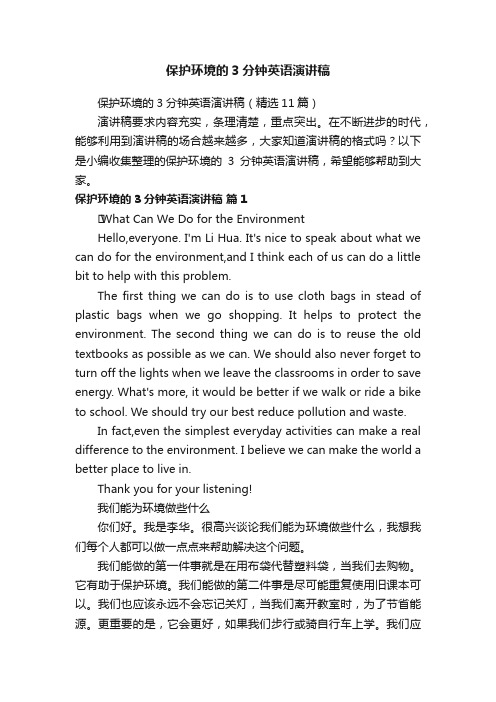
保护环境的3分钟英语演讲稿保护环境的3分钟英语演讲稿(精选11篇)演讲稿要求内容充实,条理清楚,重点突出。
在不断进步的时代,能够利用到演讲稿的场合越来越多,大家知道演讲稿的格式吗?以下是小编收集整理的保护环境的3分钟英语演讲稿,希望能够帮助到大家。
保护环境的3分钟英语演讲稿篇1•What Can We Do for the EnvironmentHello,everyone. I'm Li Hua. It's nice to speak about what we can do for the environment,and I think each of us can do a little bit to help with this problem.The first thing we can do is to use cloth bags in stead of plastic bags when we go shopping. It helps to protect the environment. The second thing we can do is to reuse the old textbooks as possible as we can. We should also never forget to turn off the lights when we leave the classrooms in order to save energy. What's more, it would be better if we walk or ride a bike to school. We should try our best reduce pollution and waste.In fact,even the simplest everyday activities can make a real difference to the environment. I believe we can make the world a better place to live in.Thank you for your listening!我们能为环境做些什么你们好。
环保的演讲稿英语3分钟(精选14篇)
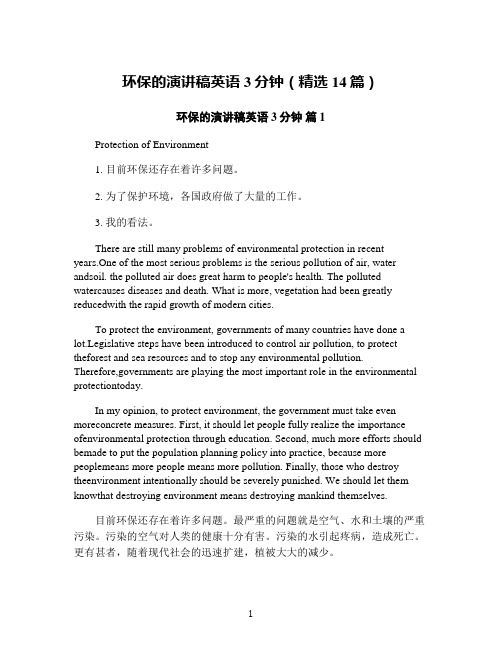
环保的演讲稿英语3分钟(精选14篇)环保的演讲稿英语3分钟篇1Protection of Environment1. 目前环保还存在着许多问题。
2. 为了保护环境,各国政府做了大量的工作。
3. 我的看法。
There are still many problems of environmental protection in recent years.One of the most serious problems is the serious pollution of air, water andsoil. the polluted air does great harm to people's health. The polluted watercauses diseases and death. What is more, vegetation had been greatly reducedwith the rapid growth of modern cities.To protect the environment, governments of many countries have done a lot.Legislative steps have been introduced to control air pollution, to protect theforest and sea resources and to stop any environmental pollution. Therefore,governments are playing the most important role in the environmental protectiontoday.In my opinion, to protect environment, the government must take even moreconcrete measures. First, it should let people fully realize the importance ofenvironmental protection through education. Second, much more efforts should bemade to put the population planning policy into practice, because more peoplemeans more people means more pollution. Finally, those who destroy theenvironment intentionally should be severely punished. We should let them knowthat destroying environment means destroying mankind themselves.目前环保还存在着许多问题。
保护海洋演讲稿英语作文
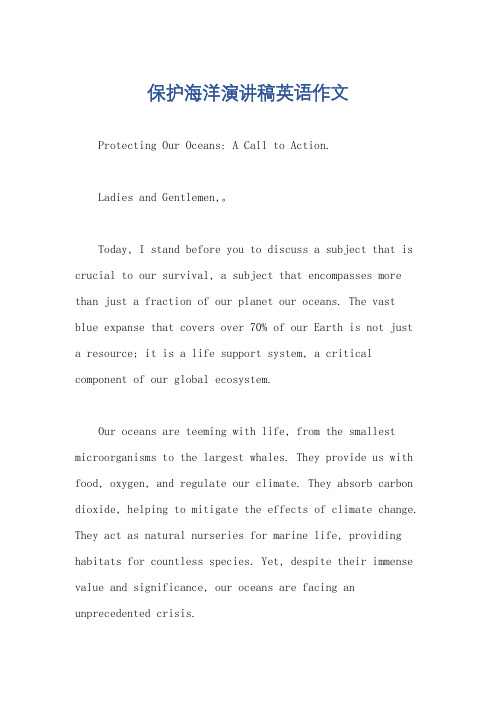
保护海洋演讲稿英语作文Protecting Our Oceans: A Call to Action.Ladies and Gentlemen,。
Today, I stand before you to discuss a subject that is crucial to our survival, a subject that encompasses more than just a fraction of our planet our oceans. The vast blue expanse that covers over 70% of our Earth is not just a resource; it is a life support system, a critical component of our global ecosystem.Our oceans are teeming with life, from the smallest microorganisms to the largest whales. They provide us with food, oxygen, and regulate our climate. They absorb carbon dioxide, helping to mitigate the effects of climate change. They act as natural nurseries for marine life, providing habitats for countless species. Yet, despite their immense value and significance, our oceans are facing an unprecedented crisis.Pollution, overfishing, climate change, and loss of habitat are among the many threats that our oceans face today. Each day, millions of tons of plastic and other pollutants are dumped into our oceans, poisoning the marine environment and threatening the lives of marine creatures. Overfishing has depleted many fish stocks,破坏了海洋生态系统的平衡。
保护海洋的英文演讲稿
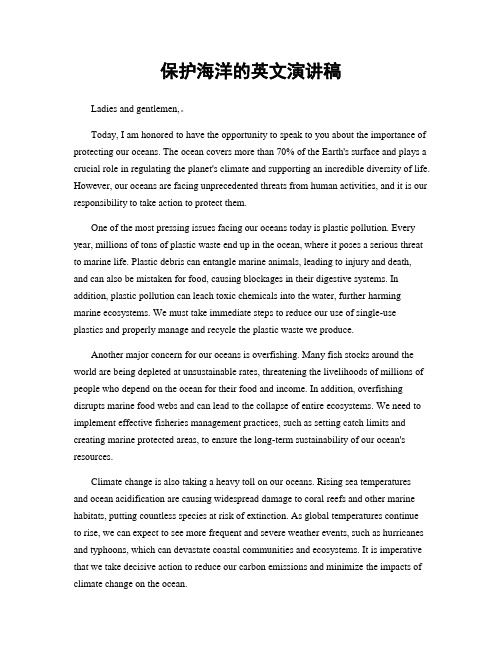
保护海洋的英文演讲稿Ladies and gentlemen,。
Today, I am honored to have the opportunity to speak to you about the importance of protecting our oceans. The ocean covers more than 70% of the Earth's surface and plays a crucial role in regulating the planet's climate and supporting an incredible diversity of life. However, our oceans are facing unprecedented threats from human activities, and it is our responsibility to take action to protect them.One of the most pressing issues facing our oceans today is plastic pollution. Every year, millions of tons of plastic waste end up in the ocean, where it poses a serious threat to marine life. Plastic debris can entangle marine animals, leading to injury and death, and can also be mistaken for food, causing blockages in their digestive systems. In addition, plastic pollution can leach toxic chemicals into the water, further harming marine ecosystems. We must take immediate steps to reduce our use of single-use plastics and properly manage and recycle the plastic waste we produce.Another major concern for our oceans is overfishing. Many fish stocks around the world are being depleted at unsustainable rates, threatening the livelihoods of millions of people who depend on the ocean for their food and income. In addition, overfishing disrupts marine food webs and can lead to the collapse of entire ecosystems. We need to implement effective fisheries management practices, such as setting catch limits and creating marine protected areas, to ensure the long-term sustainability of our ocean's resources.Climate change is also taking a heavy toll on our oceans. Rising sea temperatures and ocean acidification are causing widespread damage to coral reefs and other marine habitats, putting countless species at risk of extinction. As global temperatures continueto rise, we can expect to see more frequent and severe weather events, such as hurricanes and typhoons, which can devastate coastal communities and ecosystems. It is imperative that we take decisive action to reduce our carbon emissions and minimize the impacts of climate change on the ocean.In addition to these challenges, our oceans are also threatened by pollution from agricultural runoff, oil spills, and industrial waste. These pollutants can have devastating effects on marine life and can contaminate seafood, posing a risk to human health. We must strengthen regulations and enforcement to prevent pollution from entering our oceans and hold polluters accountable for the damage they cause.Protecting our oceans is not only a matter of environmental conservation, but also a matter of human survival. The ocean provides us with food, oxygen, and vital ecosystem services, and it is up to us to ensure its health and resilience for future generations. By working together to address the threats facing our oceans, we can create a more sustainable and prosperous future for all.In conclusion, the protection of our oceans is a matter of utmost importance, and it requires the collective effort of individuals, communities, and governments around the world. We must take action to reduce plastic pollution, combat overfishing, mitigate the impacts of climate change, and prevent pollution from harming our oceans. Together, we can make a difference and ensure the health and vitality of our oceans for generations to come.Thank you.。
保护海洋的英语演讲稿
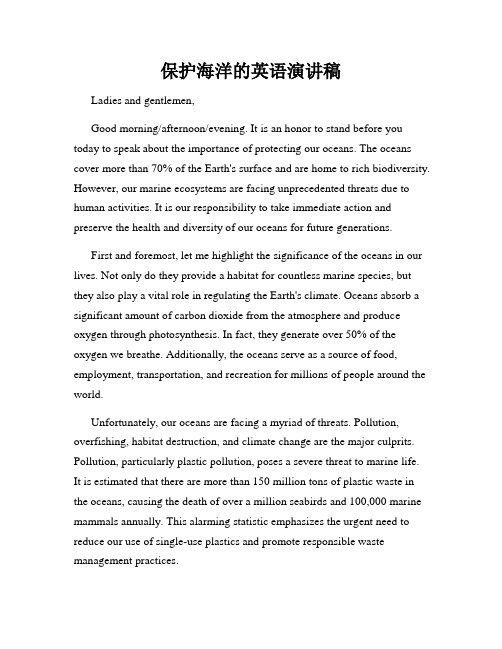
保护海洋的英语演讲稿Ladies and gentlemen,Good morning/afternoon/evening. It is an honor to stand before you today to speak about the importance of protecting our oceans. The oceans cover more than 70% of the Earth's surface and are home to rich biodiversity. However, our marine ecosystems are facing unprecedented threats due to human activities. It is our responsibility to take immediate action and preserve the health and diversity of our oceans for future generations.First and foremost, let me highlight the significance of the oceans in our lives. Not only do they provide a habitat for countless marine species, but they also play a vital role in regulating the Earth's climate. Oceans absorb a significant amount of carbon dioxide from the atmosphere and produce oxygen through photosynthesis. In fact, they generate over 50% of the oxygen we breathe. Additionally, the oceans serve as a source of food, employment, transportation, and recreation for millions of people around the world.Unfortunately, our oceans are facing a myriad of threats. Pollution, overfishing, habitat destruction, and climate change are the major culprits. Pollution, particularly plastic pollution, poses a severe threat to marine life. It is estimated that there are more than 150 million tons of plastic waste in the oceans, causing the death of over a million seabirds and 100,000 marine mammals annually. This alarming statistic emphasizes the urgent need to reduce our use of single-use plastics and promote responsible waste management practices.Overfishing is another pressing issue that needs immediate attention. Unsustainable fishing practices have led to a decline in fish populations worldwide. Many species, such as the Atlantic bluefin tuna and the Pacific salmon, are on the brink of extinction. We must promote sustainable fishing practices, establish marine protected areas, and enforce strict regulations to prevent overfishing and allow fish stocks to replenish.Habitat destruction is also contributing to the degradation of our marine ecosystems. Coastal development, including the construction of harbors, resorts, and industries, destroys and alters critical habitats such as coral reefs and mangroves. These habitats are not only home to a diverse array of species but also provide protection against storms and erosion. It is crucial to protect and restore these habitats to maintain the balance of marine ecosystems.Climate change is perhaps the most significant threat to our oceans. Rising temperatures, ocean acidification, and sea-level rise are adversely impacting marine life. Coral reefs, often referred to as the "rainforests of the sea," are particularly vulnerable to higher temperatures. Bleaching events, caused by increased water temperatures, have resulted in the widespread death of coral reefs worldwide. To combat climate change, we must reduce greenhouse gas emissions, transition to renewable energy sources, and support initiatives that promote climate resilience and adaptation.Now, let us discuss what actions we can take to protect our oceans. Education and awareness are crucial. We need to educate ourselves and others about the importance of oceans and the threats they face. By raising awareness, we can inspire individuals, communities, and governments totake action. It is imperative to promote sustainable lifestyles, reduce our carbon footprint, recycle and properly dispose of waste.Furthermore, we must advocate for policies that protect our oceans. Support organizations that work towards ocean conservation and engage in initiatives that promote marine protection. Encourage sustainable fishing practices and support marine reserves. We need to pressure governments and corporations to implement stricter regulations on pollution, fishing, and coastal development. By joining forces, we can exert a greater influence and ensure effective protection of our oceans.In conclusion, it is high time we recognized the importance of protecting our oceans. The time for action is now. We must address pollution, overfishing, habitat destruction, and climate change to ensure the long-term health and sustainability of our marine ecosystems. By educating ourselves, advocating for change, and promoting sustainable practices, we can be the catalysts for positive change. Let us leave a legacy of a clean and thriving ocean for future generations. Together, we can make a difference.Thank you for your attention.。
保护海洋的动物演讲稿英语
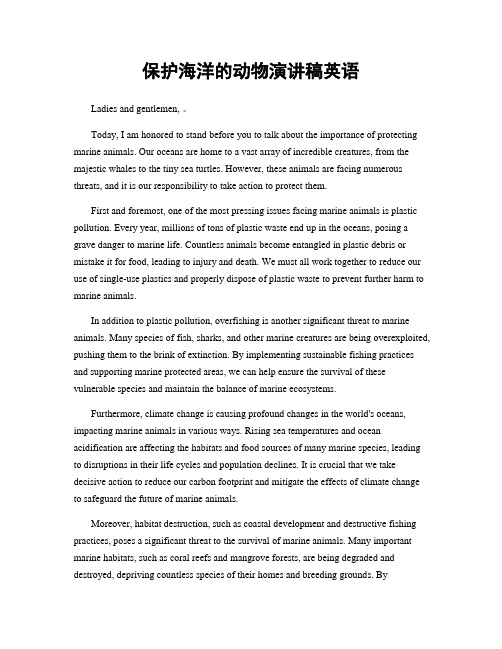
保护海洋的动物演讲稿英语Ladies and gentlemen, 。
Today, I am honored to stand before you to talk about the importance of protecting marine animals. Our oceans are home to a vast array of incredible creatures, from the majestic whales to the tiny sea turtles. However, these animals are facing numerous threats, and it is our responsibility to take action to protect them.First and foremost, one of the most pressing issues facing marine animals is plastic pollution. Every year, millions of tons of plastic waste end up in the oceans, posing a grave danger to marine life. Countless animals become entangled in plastic debris or mistake it for food, leading to injury and death. We must all work together to reduce our use of single-use plastics and properly dispose of plastic waste to prevent further harm to marine animals.In addition to plastic pollution, overfishing is another significant threat to marine animals. Many species of fish, sharks, and other marine creatures are being overexploited, pushing them to the brink of extinction. By implementing sustainable fishing practices and supporting marine protected areas, we can help ensure the survival of these vulnerable species and maintain the balance of marine ecosystems.Furthermore, climate change is causing profound changes in the world's oceans, impacting marine animals in various ways. Rising sea temperatures and ocean acidification are affecting the habitats and food sources of many marine species, leading to disruptions in their life cycles and population declines. It is crucial that we take decisive action to reduce our carbon footprint and mitigate the effects of climate change to safeguard the future of marine animals.Moreover, habitat destruction, such as coastal development and destructive fishing practices, poses a significant threat to the survival of marine animals. Many important marine habitats, such as coral reefs and mangrove forests, are being degraded and destroyed, depriving countless species of their homes and breeding grounds. Bypromoting sustainable coastal development and establishing marine protected areas, we can help preserve vital habitats for marine animals and ensure their long-term survival.In conclusion, protecting marine animals is a critical task that requires the collective efforts of individuals, communities, and governments worldwide. By addressing the issues of plastic pollution, overfishing, climate change, and habitat destruction, we can make a positive impact on the lives of marine animals and the health of our oceans. Let us all commit to taking action to protect these incredible creatures and ensure a sustainable future for our marine ecosystems. Thank you.。
关于海洋保护的英文小作文
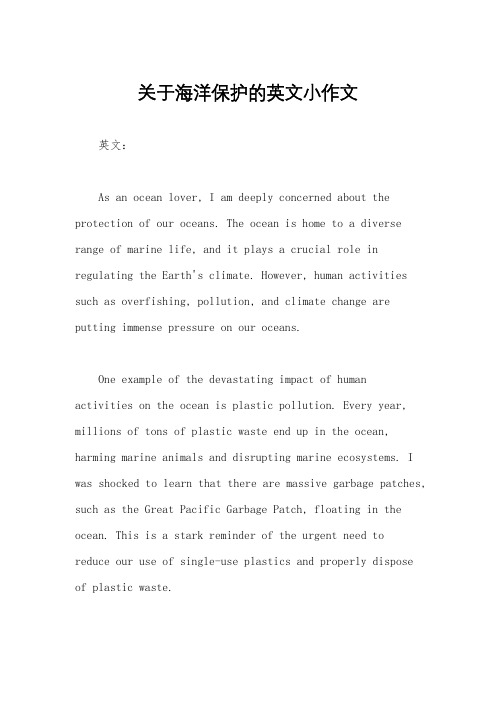
关于海洋保护的英文小作文英文:As an ocean lover, I am deeply concerned about the protection of our oceans. The ocean is home to a diverse range of marine life, and it plays a crucial role in regulating the Earth's climate. However, human activities such as overfishing, pollution, and climate change are putting immense pressure on our oceans.One example of the devastating impact of humanactivities on the ocean is plastic pollution. Every year, millions of tons of plastic waste end up in the ocean, harming marine animals and disrupting marine ecosystems. I was shocked to learn that there are massive garbage patches, such as the Great Pacific Garbage Patch, floating in the ocean. This is a stark reminder of the urgent need toreduce our use of single-use plastics and properly disposeof plastic waste.Another issue that deeply concerns me is overfishing. Many fish populations are being depleted due to overfishing, and this has serious consequences for marine ecosystems and the livelihoods of coastal communities that depend onfishing for their survival. I recently read about theplight of the vaquita, a critically endangered porpoise species that is on the brink of extinction due to bycatchin illegal fishing operations. It is heartbreaking to think that we could lose such a beautiful and unique species dueto human greed and disregard for conservation measures.中文:作为一个热爱海洋的人,我对保护海洋问题深感担忧。
关于保护海洋的英语演讲稿
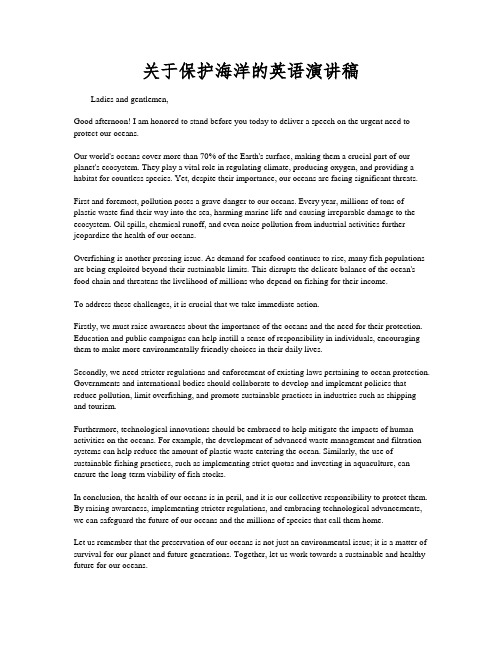
关于保护海洋的英语演讲稿Ladies and gentlemen,Good afternoon! I am honored to stand before you today to deliver a speech on the urgent need to protect our oceans.Our world's oceans cover more than 70% of the Earth's surface, making them a crucial part of our planet's ecosystem. They play a vital role in regulating climate, producing oxygen, and providing a habitat for countless species. Yet, despite their importance, our oceans are facing significant threats.First and foremost, pollution poses a grave danger to our oceans. Every year, millions of tons of plastic waste find their way into the sea, harming marine life and causing irreparable damage to the ecosystem. Oil spills, chemical runoff, and even noise pollution from industrial activities further jeopardize the health of our oceans.Overfishing is another pressing issue. As demand for seafood continues to rise, many fish populations are being exploited beyond their sustainable limits. This disrupts the delicate balance of the ocean's food chain and threatens the livelihood of millions who depend on fishing for their income.To address these challenges, it is crucial that we take immediate action.Firstly, we must raise awareness about the importance of the oceans and the need for their protection. Education and public campaigns can help instill a sense of responsibility in individuals, encouraging them to make more environmentally friendly choices in their daily lives.Secondly, we need stricter regulations and enforcement of existing laws pertaining to ocean protection. Governments and international bodies should collaborate to develop and implement policies that reduce pollution, limit overfishing, and promote sustainable practices in industries such as shipping and tourism.Furthermore, technological innovations should be embraced to help mitigate the impacts of human activities on the oceans. For example, the development of advanced waste management and filtration systems can help reduce the amount of plastic waste entering the ocean. Similarly, the use of sustainable fishing practices, such as implementing strict quotas and investing in aquaculture, can ensure the long-term viability of fish stocks.In conclusion, the health of our oceans is in peril, and it is our collective responsibility to protect them. By raising awareness, implementing stricter regulations, and embracing technological advancements, we can safeguard the future of our oceans and the millions of species that call them home.Let us remember that the preservation of our oceans is not just an environmental issue; it is a matter of survival for our planet and future generations. Together, let us work towards a sustainable and healthy future for our oceans.Thank you.。
保护海洋口译英文作文
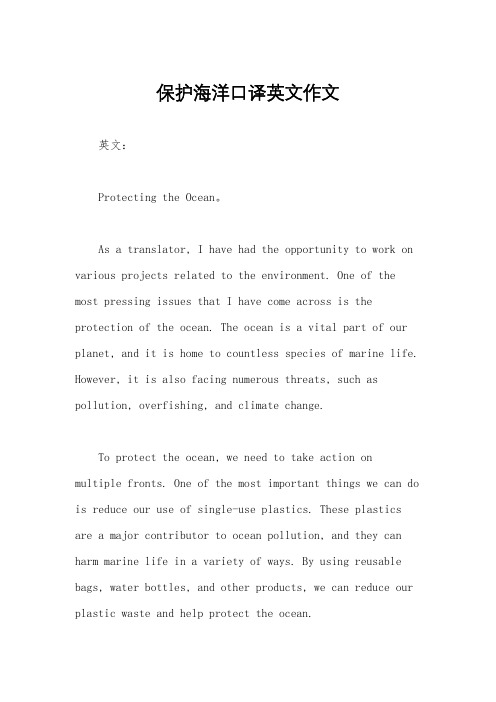
保护海洋口译英文作文英文:Protecting the Ocean。
As a translator, I have had the opportunity to work on various projects related to the environment. One of the most pressing issues that I have come across is the protection of the ocean. The ocean is a vital part of our planet, and it is home to countless species of marine life. However, it is also facing numerous threats, such as pollution, overfishing, and climate change.To protect the ocean, we need to take action onmultiple fronts. One of the most important things we can do is reduce our use of single-use plastics. These plastics are a major contributor to ocean pollution, and they can harm marine life in a variety of ways. By using reusable bags, water bottles, and other products, we can reduce our plastic waste and help protect the ocean.Another important step is to support sustainablefishing practices. Overfishing is a serious problem that can lead to the depletion of fish populations, which can have far-reaching consequences for both the ocean ecosystem and human communities that rely on fishing for their livelihoods. By choosing sustainably caught seafood and supporting fisheries that use responsible practices, we can help ensure that fish populations remain healthy and abundant.Finally, we need to take action on climate change. Rising temperatures and ocean acidification are already having a significant impact on the ocean, and these effects are likely to become more severe in the coming years. By reducing our greenhouse gas emissions and supporting policies that address climate change, we can help protect the ocean and the planet as a whole.Overall, protecting the ocean requires a comprehensive approach that addresses the many threats it faces. By taking action on multiple fronts, we can help ensure thatthe ocean remains a vibrant and healthy part of our planet for generations to come.中文:保护海洋。
保护海洋小学的英文作文
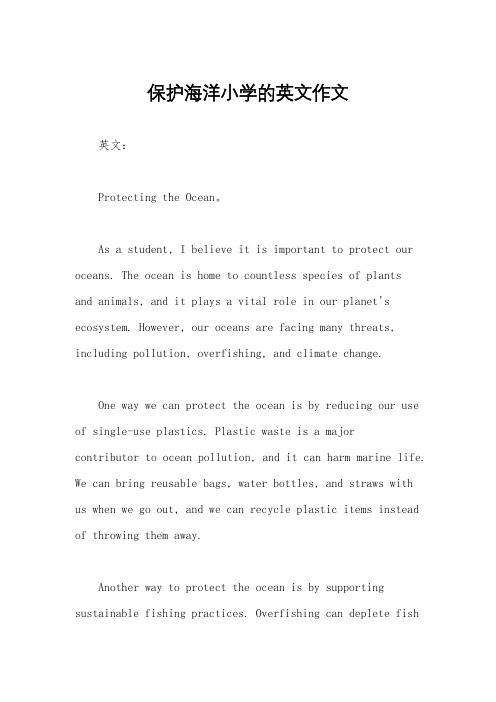
保护海洋小学的英文作文英文:Protecting the Ocean。
As a student, I believe it is important to protect our oceans. The ocean is home to countless species of plantsand animals, and it plays a vital role in our planet's ecosystem. However, our oceans are facing many threats, including pollution, overfishing, and climate change.One way we can protect the ocean is by reducing our use of single-use plastics. Plastic waste is a majorcontributor to ocean pollution, and it can harm marine life. We can bring reusable bags, water bottles, and straws with us when we go out, and we can recycle plastic items instead of throwing them away.Another way to protect the ocean is by supporting sustainable fishing practices. Overfishing can deplete fishpopulations and disrupt the ocean's food chain. By choosing sustainably sourced seafood, we can help protect marine ecosystems and ensure that fish populations remain healthy.Finally, we can take action to address climate change. Rising temperatures and ocean acidification are already having a negative impact on the ocean and its inhabitants. We can reduce our carbon footprint by using public transportation, eating a plant-based diet, and conserving energy at home.中文:保护海洋。
protect the ocean英语演讲稿李华
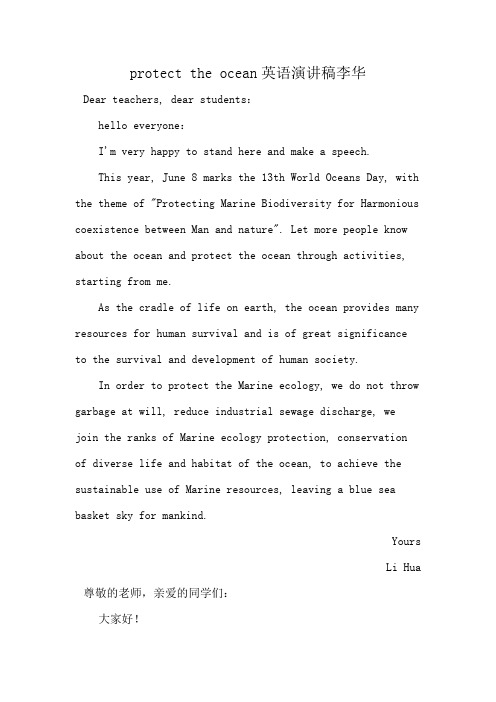
protect the ocean英语演讲稿李华Dear teachers, dear students:hello everyone:I'm very happy to stand here and make a speech.This year, June 8 marks the 13th World Oceans Day, with the theme of "Protecting Marine Biodiversity for Harmonious coexistence between Man and nature". Let more people know about the ocean and protect the ocean through activities, starting from me.As the cradle of life on earth, the ocean provides many resources for human survival and is of great significanceto the survival and development of human society.In order to protect the Marine ecology, we do not throw garbage at will, reduce industrial sewage discharge, wejoin the ranks of Marine ecology protection, conservationof diverse life and habitat of the ocean, to achieve the sustainable use of Marine resources, leaving a blue sea basket sky for mankind.YoursLi Hua 尊敬的老师,亲爱的同学们:大家好!我很高兴能够站在这里演讲。
英文保护海洋作文
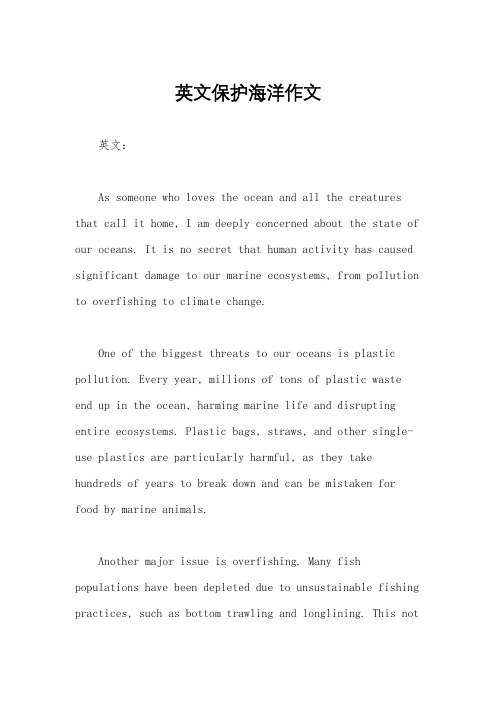
英文保护海洋作文英文:As someone who loves the ocean and all the creatures that call it home, I am deeply concerned about the state of our oceans. It is no secret that human activity has caused significant damage to our marine ecosystems, from pollution to overfishing to climate change.One of the biggest threats to our oceans is plastic pollution. Every year, millions of tons of plastic waste end up in the ocean, harming marine life and disrupting entire ecosystems. Plastic bags, straws, and other single-use plastics are particularly harmful, as they take hundreds of years to break down and can be mistaken for food by marine animals.Another major issue is overfishing. Many fish populations have been depleted due to unsustainable fishing practices, such as bottom trawling and longlining. This notonly threatens the survival of certain species, but alsohas a ripple effect on the entire food chain.Climate change is also having a devastating impact on our oceans. Rising temperatures, ocean acidification, and sea level rise are all affecting marine life and ecosystems. Coral reefs, for example, are particularly vulnerable to these changes and are dying at an alarming rate.So what can we do to protect our oceans? One simplestep is to reduce our use of single-use plastics. Bringyour own reusable bags and water bottles, and say no to plastic straws. We can also support sustainable fishing practices and choose seafood that is sourced responsibly. And we can all do our part to reduce our carbon footprint and fight climate change.中文:作为一个热爱海洋和所有生物的人,我非常关心我们海洋的状况。
2022年高考英语作文保护海洋演讲稿
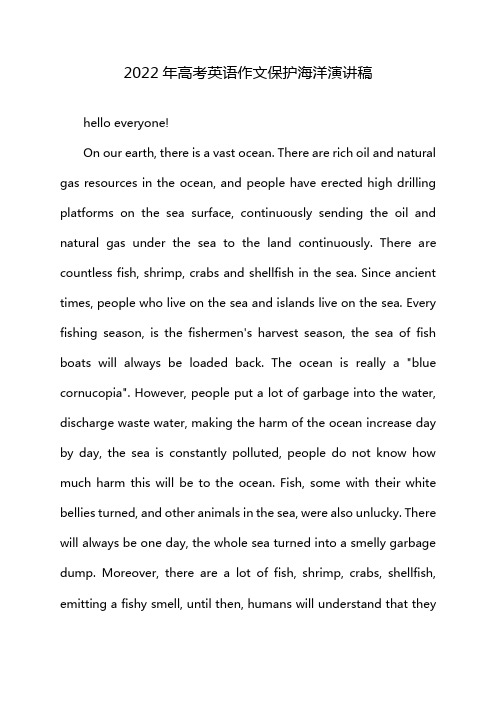
2022年高考英语作文保护海洋演讲稿hello everyone!On our earth, there is a vast ocean. There are rich oil and natural gas resources in the ocean, and people have erected high drilling platforms on the sea surface, continuously sending the oil and natural gas under the sea to the land continuously. There are countless fish, shrimp, crabs and shellfish in the sea. Since ancient times, people who live on the sea and islands live on the sea. Every fishing season, is the fishermen's harvest season, the sea of fish boats will always be loaded back. The ocean is really a "blue cornucopia". However, people put a lot of garbage into the water, discharge waste water, making the harm of the ocean increase day by day, the sea is constantly polluted, people do not know how much harm this will be to the ocean. Fish, some with their white bellies turned, and other animals in the sea, were also unlucky. There will always be one day, the whole sea turned into a smelly garbage dump. Moreover, there are a lot of fish, shrimp, crabs, shellfish, emitting a fishy smell, until then, humans will understand that theyhave done something wrong. People also carried all the resources of the ocean to the land. Although the sea resources of the sea resources are very much, but, if every day the sea resources to the land, slowly, the sea smaller day by day, one day, people came to take, but the sea has become a river, people will be dumbfounded. Marine life is a valuable fishery resource, providing human beings with rich fish and shrimp and various seafood every day. Now, the sea is in danger, I hope that human beings can join hands to protect the sea, let the sea full of life!Thank you!。
英文保护海洋作文
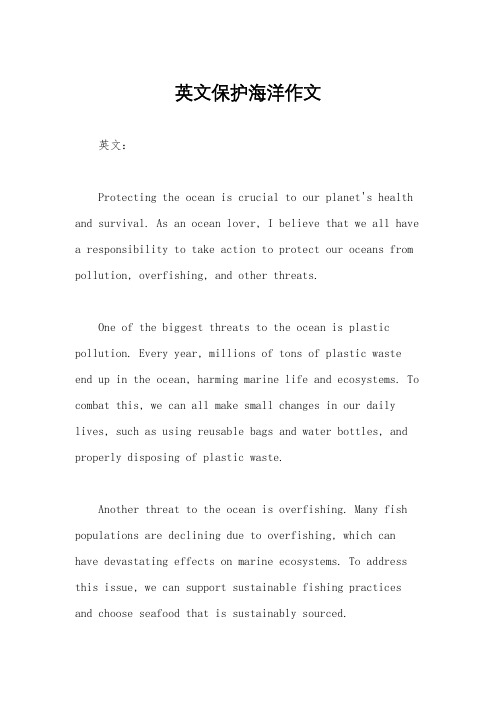
英文保护海洋作文英文:Protecting the ocean is crucial to our planet's health and survival. As an ocean lover, I believe that we all have a responsibility to take action to protect our oceans from pollution, overfishing, and other threats.One of the biggest threats to the ocean is plastic pollution. Every year, millions of tons of plastic waste end up in the ocean, harming marine life and ecosystems. To combat this, we can all make small changes in our daily lives, such as using reusable bags and water bottles, and properly disposing of plastic waste.Another threat to the ocean is overfishing. Many fish populations are declining due to overfishing, which can have devastating effects on marine ecosystems. To address this issue, we can support sustainable fishing practices and choose seafood that is sustainably sourced.Finally, climate change is also having a major impacton the ocean. Rising temperatures and ocean acidification are damaging coral reefs and other marine habitats. To combat this, we can reduce our carbon footprint by using renewable energy sources and making lifestyle changes that reduce our impact on the environment.In conclusion, protecting the ocean is essential forour planet's survival. By making small changes in our daily lives and supporting sustainable practices, we can all play a role in preserving our oceans for future generations.中文:保护海洋对于我们的星球健康和生存至关重要。
保护海洋英语演讲稿大学
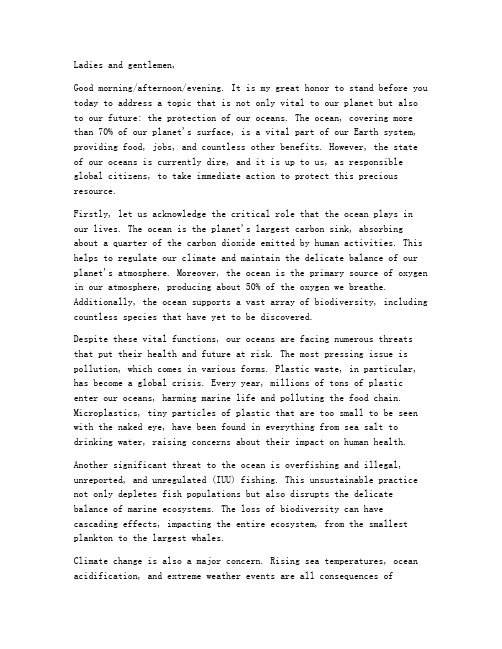
Ladies and gentlemen,Good morning/afternoon/evening. It is my great honor to stand before you today to address a topic that is not only vital to our planet but also to our future: the protection of our oceans. The ocean, covering more than 70% of our planet's surface, is a vital part of our Earth system, providing food, jobs, and countless other benefits. However, the state of our oceans is currently dire, and it is up to us, as responsible global citizens, to take immediate action to protect this precious resource.Firstly, let us acknowledge the critical role that the ocean plays in our lives. The ocean is the planet's largest carbon sink, absorbing about a quarter of the carbon dioxide emitted by human activities. This helps to regulate our climate and maintain the delicate balance of our planet's atmosphere. Moreover, the ocean is the primary source of oxygen in our atmosphere, producing about 50% of the oxygen we breathe. Additionally, the ocean supports a vast array of biodiversity, including countless species that have yet to be discovered.Despite these vital functions, our oceans are facing numerous threats that put their health and future at risk. The most pressing issue is pollution, which comes in various forms. Plastic waste, in particular, has become a global crisis. Every year, millions of tons of plastic enter our oceans, harming marine life and polluting the food chain. Microplastics, tiny particles of plastic that are too small to be seen with the naked eye, have been found in everything from sea salt to drinking water, raising concerns about their impact on human health.Another significant threat to the ocean is overfishing and illegal, unreported, and unregulated (IUU) fishing. This unsustainable practice not only depletes fish populations but also disrupts the delicate balance of marine ecosystems. The loss of biodiversity can have cascading effects, impacting the entire ecosystem, from the smallest plankton to the largest whales.Climate change is also a major concern. Rising sea temperatures, ocean acidification, and extreme weather events are all consequences ofclimate change that have a direct impact on marine life. Coral reefs, which are some of the most diverse ecosystems on Earth, are particularly vulnerable to these changes. In fact, many coral reefs are already experiencing severe bleaching events, which can lead to the death of corals and the loss of habitats for countless marine species.To address these pressing issues, we must take a multi-faceted approach that involves both global cooperation and individual action. Here are some key steps that we can take to protect our oceans:1. Reducing Plastic Pollution: We need to minimize the use of single-use plastics and implement effective waste management systems. Governments, businesses, and individuals must all contribute to reducing plastic waste, both at the source and through recycling and proper disposal.2. Sustainable Fishing Practices: We must promote and enforce sustainable fishing practices that ensure the long-term health of fish populations and marine ecosystems. This includes supporting the implementation of international fishing agreements and combating IUU fishing.3. Addressing Climate Change: We must take immediate action to reduce greenhouse gas emissions and adapt to the impacts of climate change. This includes transitioning to renewable energy sources, improving energy efficiency, and protecting natural carbon sinks such as forests and the ocean.4. Protecting Marine Ecosystems: Establishing marine protected areas (MPAs) is crucial for preserving biodiversity and protecting vulnerable ecosystems. These areas can serve as safe havens for marine life and serve as models for sustainable management practices.5. Education and Awareness: Raising awareness about the importance of ocean health is essential. We must educate future generations about the ocean's value and the threats it faces. By fostering a sense of stewardship, we can encourage responsible behavior and inspire others to join the fight for ocean protection.6. International Collaboration: The ocean is a global resource that requires global cooperation. We must work together with other nations to develop and implement policies that protect our oceans, regardless of national boundaries.In conclusion, the protection of our oceans is not a task that can be left to governments, businesses, or individuals alone. It requires a collective effort, a unified commitment to preserving the health and vitality of our planet's largest ecosystem. As university students, we are part of a generation that will inherit the legacy of our actions today. Let us not be the generation that took for granted the health of our oceans, but rather the generation that took action to safeguard them for future generations.Thank you for your attention, and let us all work together to ensurethat our oceans continue to thrive and provide the countless benefits that they do today, for tomorrow and beyond.[Applause]。
关于海洋环境保护的英语演讲
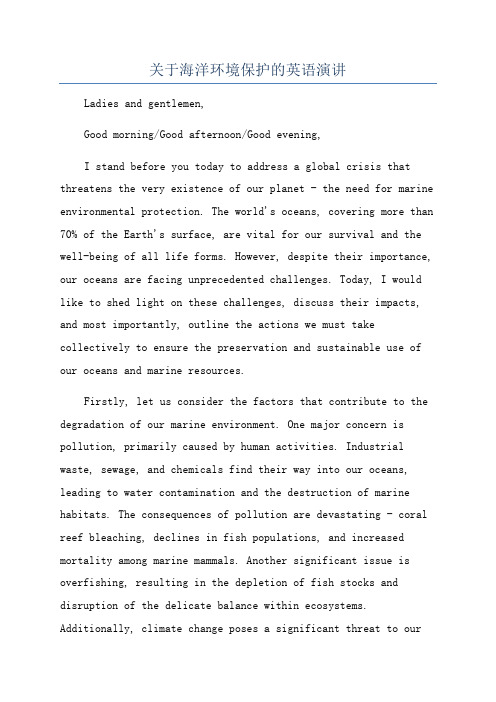
关于海洋环境保护的英语演讲Ladies and gentlemen,Good morning/Good afternoon/Good evening,I stand before you today to address a global crisis that threatens the very existence of our planet - the need for marine environmental protection. The world's oceans, covering more than 70% of the Earth's surface, are vital for our survival and the well-being of all life forms. However, despite their importance, our oceans are facing unprecedented challenges. Today, I would like to shed light on these challenges, discuss their impacts, and most importantly, outline the actions we must take collectively to ensure the preservation and sustainable use of our oceans and marine resources.Firstly, let us consider the factors that contribute to the degradation of our marine environment. One major concern is pollution, primarily caused by human activities. Industrial waste, sewage, and chemicals find their way into our oceans, leading to water contamination and the destruction of marine habitats. The consequences of pollution are devastating - coral reef bleaching, declines in fish populations, and increased mortality among marine mammals. Another significant issue is overfishing, resulting in the depletion of fish stocks and disruption of the delicate balance within ecosystems. Additionally, climate change poses a significant threat to ouroceans, leading to rising sea levels, ocean acidification, and more frequent extreme weather events.Mitigating climate change is another vital aspect of marine environmental protection. We must transition to clean and renewable energy sources to reduce carbon emissions and the overall ecological footprint. Promoting the use of renewable energy technologies such as wind and solar power can significantly reduce the reliance on fossil fuels and their detrimental impact on the environment.Thank you.。
